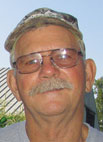
A few are red, most are black, but they are all Angus at Wallace Cattle Company, where Ernie and Tammy Wallace may have compromised on color, but never on the quality of their registered herd.
Tammy loves the reds she grew up with in Iowa, where her parents were pioneer breeders and have been in the business more than 40 years. Ernie is partial to the blacks, a love he picked up while working as a young man on a purebred ranch in Texas. Together, the two have been raising registered Angus since they were married 18 years ago.
“We have predominantly black now, but we keep enough reds to keep Tammy happy,” Ernie said. “They’re the same cattle, just different colors.”
The feature that first drew the Wallaces to the Angus was their mothering ability, Ernie said, but through the years, they have come to appreciate more and more the superior carcass the breed produces, with its excellent marbling and muscling qualities.
“It probably (produces yield and grade) better than any other breed,” Ernie said.
The Wallaces run about 125 cows on their 200 acres in Lawrence County, where they have lived since 1997. Like other producers, they find the ever-rising costs of fuel, fertilizer and land are making it more difficult to stay on the farm without taking jobs in town.
“It’s getting pretty challenging,” Ernie said. “You have to get pretty creative to make it work.”
The two do custom AI work, time breeding cows for other producers — sometimes up to 100 head a day. Ernie also sells semen for GenX Corporation, and is a sales consultant who purchases registered animals for other people.
“You have to do other things to make it all work,” Ernie said.
Because they have limited acreage, the Wallaces have for the past three years used an embryo transfer program for calf production, in which they place frozen embryos in cows belonging to neighbors with commercial herds. The Wallaces pay expenses and help plant the embryos, which average a 60 percent conception rate and produce calves that can be registered. The calves stay with the neighbors until weaning time.
“We do that because we don’t have enough land to expand our herd,” Ernie said. “It gives us a way to raise more calves.”
While breeding for quality animals and herd improvement is always a goal with the Wallaces, they believe moderation is a key to success in today’s livestock market. Generally, they said, they seek the middle of the road when it comes to characteristics such as size and growth EPDs.
“With today’s feed costs, you have to have a more moderate animal that is more efficient,” Ernie said. “A higher growth animal will need more feed to maintain body weight, while more efficient animals will need less feed to get them where you want them to be.
“We try not to go to extremes,” he added. “More is not always better.”
The Wallaces also like to handle their own marketing, most of which is done directly from the farm. Each October, Wallace Cattle Company hosts a production sale, and this year will have its first-ever spring sale April 13. Primarily, the sales feature females in cow/calf pairs and bred and open heifers. Bull sales are mainly by private treaty.
Many of their buyers are young.
“A lot of our operation concentrates on the junior program,” Tammy said. “We raise animals for kids to show.”
All Wallace heifers are broken to halter before being sold, giving youngsters animals that are calm but still need some training.
“They still need work, but it takes the fight out of them,” Ernie said. “It gives a young person a good experience, especially if it’s their first time to show.”
“We have helped a lot of kids get started,” Tammy added. “And that’s a good feeling.”
Ernie and Tammy’s two children, Paige, 16, and Sam, 14, are among them. Paige showed the 2004 grand champion heifer at the National Junior Angus Show, and Sam’s cookoff team was first in national competition at the ranch rodeo last year. He also showed the champion steer at the Gold Buckle Gala at the Ozark Empire Fair. The family had the 2005 grand champion heifer at the Denver National Western Show and the reserve grand champion heifer in 2003.
The Wallaces’ commitment to the breed goes deeper than simply maintaining a registered Angus herd. Paige and Sam are active members of the National Junior Angus Association, while Tammy and Ernie are active supporters of the American Angus Association and its programs and activities.
Tammy is an adviser for the national junior board, and Ernie is a judge for several national shows. In 2003, Tammy was the first woman in its 100-year history ever to serve as a judge for sale bulls at the National Western in Denver.
They have never considered raising a different breed. As far as the Wallaces are concerned, Angus is it.
“It’s a breed we’ve done well with,” Ernie said. “And if something is working for you, you probably need to stay with it.”







